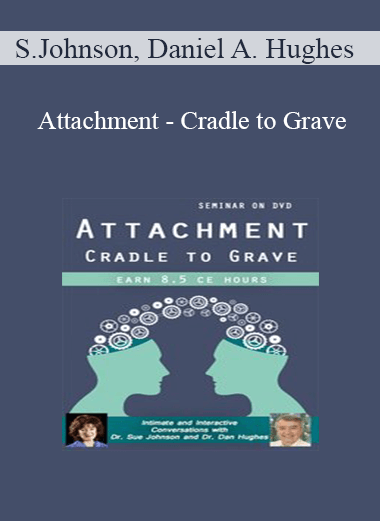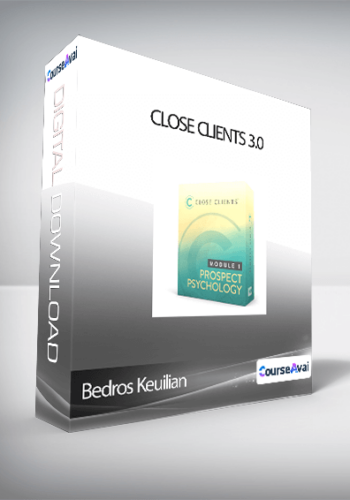Susan Johnson, Daniel A. Hughes – Attachment – Cradle to Grave: Intimate and Interactive Conversations with Dr. Sue Johnson and Dr. Dan Hughes
Original price was: $219.99.$36.90Current price is: $36.90.
[Instant Download] – Immediately deliver the download link after receiving the payment
Description
Unlock your potential with the Unlock your potential with the Susan Johnson, Daniel A. Hughes – Attachment – Cradle to Grave: Intimate and Interactive Conversations with Dr. Sue Johnson and Dr. Dan HughesSusan Johnson, Daniel A. Hughes – Attachment – Cradle to Grave: Intimate and Interactive Conversations with Dr. Sue Johnson and Dr. Dan Hughes course for only course for only Original price was: $219.99.Original price was: $219.99.$$36.9036.90Current price is: $36.90.Current price is: $36.90. at at Giolib.comGiolib.com! Explore our comprehensive library of over 60,000 downloadable digital courses across various ! Explore our comprehensive library of over 60,000 downloadable digital courses across various Medical & HealthMedical & Health. Get expert-led, self-paced learning at up to 80% savings. Elevate your skills today!. Get expert-led, self-paced learning at up to 80% savings. Elevate your skills today!
- Faculty:Faculty:
- Susan Johnson | Daniel A. HughesSusan Johnson | Daniel A. Hughes
- Duration:Duration:
- 8 Hours 46 Minutes8 Hours 46 Minutes
- Format:Format:
- Audio and VideoAudio and Video
- Copyright:Copyright:
- Jul 22, 2015Jul 22, 2015
Description
Outline
- Session 1-The Framework of EFT and Attachment – Part 1
Session 1-The Framework of EFT and Attachment – Part 1
- Understanding the Logic Behind LoveUnderstanding the Logic Behind Love
- The “EFT Tango”The “EFT Tango”
- Designed for LoveDesigned for Love
- Couples Therapy: A New EraCouples Therapy: A New Era
- The Importance of a Secure Emotional ConnectionThe Importance of a Secure Emotional Connection
- Using EFT to Understand the Nature of RelationshipsUsing EFT to Understand the Nature of Relationships
- A New Science of LoveA New Science of Love
- Session 2-The Framework of EFT and Attachment – Part 2
Session 2-The Framework of EFT and Attachment – Part 2
- Changing the Responsiveness to Threat with EFTChanging the Responsiveness to Threat with EFT
- EFT is ExperientialEFT is Experiential
- Primary Affect – Exploring Pivotal MomentsPrimary Affect – Exploring Pivotal Moments
- The 6 Core EmotionsThe 6 Core Emotions
- Working within the Emotion and Affect RegulationWorking within the Emotion and Affect Regulation
- EFT Core AssumptionsEFT Core Assumptions
- Code of Attachment – Primary NeedsCode of Attachment – Primary Needs
- Attachment Theory – Map of the Landscape of LoveAttachment Theory – Map of the Landscape of Love
- EFT Stages & StepsEFT Stages & Steps
- Session 3-Dyadic Development Psychotherapy – Part 1
Session 3-Dyadic Development Psychotherapy – Part 1
- Attunement & Rhythmic ExpressionAttunement & Rhythmic Expression
- The Importance of IntersubjectivityThe Importance of Intersubjectivity
- Using Curiosity to Develop a PerceptionUsing Curiosity to Develop a Perception
- Using Attachment to Understand Developmental TraumaUsing Attachment to Understand Developmental Trauma
- Research Supporting AttachmentResearch Supporting Attachment
- Self-Regulation – For the Therapist and for the ChildSelf-Regulation – For the Therapist and for the Child
- Discipline in Secure Attachments vs. Insecure AttachmentsDiscipline in Secure Attachments vs. Insecure Attachments
- 3 Major Relational Systems in Mammals3 Major Relational Systems in Mammals
- Session 4-Dyadic Development Psychotherapy – Part 2
Session 4-Dyadic Development Psychotherapy – Part 2
- Speaking for the Child: Verbal and Non-Verbal ResponsesSpeaking for the Child: Verbal and Non-Verbal Responses
- Using PACE to Stay OpenUsing PACE to Stay Open
- PACE
PACE
- PlayfulPlayful
- AcceptingAccepting
- CuriousCurious
- EmpatheticEmpathetic
- First Panel Discussion with Dr. Sue Johnson and Dr. Dan Hughes
First Panel Discussion with Dr. Sue Johnson and Dr. Dan Hughes
- How does EFT work with issues of rigid gender views, or a controlling dynamic?
How does EFT work with issues of rigid gender views, or a controlling dynamic?
- Creating Safety with CouplesCreating Safety with Couples
- Creating Safety with ChildrenCreating Safety with Children
- What strategy does the therapist use to recognize their emotional response?What strategy does the therapist use to recognize their emotional response?
- How do you deal with dissociation in children?How do you deal with dissociation in children?
- How does EFT work with issues of rigid gender views, or a controlling dynamic?
How does EFT work with issues of rigid gender views, or a controlling dynamic?
- Session 5-Applying EFT within an Attachment Framework
Session 5-Applying EFT within an Attachment Framework
- The “Still Face Experiment”The “Still Face Experiment”
- How Couples React to Emotional DisconnectionHow Couples React to Emotional Disconnection
- EFT Stage1: De-escalationEFT Stage1: De-escalation
- EFT Stage 2: Restructuring the BondEFT Stage 2: Restructuring the Bond
- EFT Stage 3: ConsolidationEFT Stage 3: Consolidation
- Interventions in EFT Through ReflectionInterventions in EFT Through Reflection
- The Importance of Validation in Creating SafetyThe Importance of Validation in Creating Safety
- We are Designed to Co-Regulate with Other PeopleWe are Designed to Co-Regulate with Other People
- Evocative Responding – Process EnquiriesEvocative Responding – Process Enquiries
- Heightening, Expanding AwarenessHeightening, Expanding Awareness
- Session 6-Dyadic Development Psychotherapy – Part 3
Session 6-Dyadic Development Psychotherapy – Part 3
- Attachment is ReciprocalAttachment is Reciprocal
- Using a Storytelling Rhythm to Engage Children with an Affective/Reflective ComponentUsing a Storytelling Rhythm to Engage Children with an Affective/Reflective Component
- Working with the Parents Before the SessionWorking with the Parents Before the Session
- Understanding the Situation, Bringing the Child InUnderstanding the Situation, Bringing the Child In
- Protecting the DialogueProtecting the Dialogue
- Continuing the Rhythm through the Hard PartsContinuing the Rhythm through the Hard Parts
- No Distinction Between Directive and Non-Directive TherapyNo Distinction Between Directive and Non-Directive Therapy
- Connect – Break – RepairConnect – Break – Repair
- Non-Verbal CommunicationNon-Verbal Communication
- Starting Experiential then Moving into ReflectionStarting Experiential then Moving into Reflection
- Dialogue on Treatment Models with Dr. Sue Johnson and Dr. Dan Hughes
Dialogue on Treatment Models with Dr. Sue Johnson and Dr. Dan Hughes
- Dr. Sue: On Leading People into their Story, and Making Sense of itDr. Sue: On Leading People into their Story, and Making Sense of it
- Dr. Dan: On Validating Both Parties on Having Confidence to go to the Heart of the MatterDr. Dan: On Validating Both Parties on Having Confidence to go to the Heart of the Matter
- Dr. Sue: On Asking “Why”Dr. Sue: On Asking “Why”
- Dr. Dan: Why he Uses “Why” (within the Context of PACE)Dr. Dan: Why he Uses “Why” (within the Context of PACE)
- Dr. Sue: Validating the Positive within an Attachment FrameworkDr. Sue: Validating the Positive within an Attachment Framework
- Dr. Dan: The Validation isn’t just Observational, but ExperientialDr. Dan: The Validation isn’t just Observational, but Experiential
- Dr. Sue: Both Practices Involve Emotional Presence with the ClientsDr. Sue: Both Practices Involve Emotional Presence with the Clients
- Dr. Sue: Intersubjective Mean both People Are AffectedDr. Sue: Intersubjective Mean both People Are Affected
- How do you deal with a parent of teen who puts up a wall?How do you deal with a parent of teen who puts up a wall?
- Dr. Sue: Take Care of the Relationship – The Bond – and the Content will Take Care of ItselfDr. Sue: Take Care of the Relationship – The Bond – and the Content will Take Care of Itself
- Second Panel Discussion with Dr. Sue Johnson and Dr. Dan Hughes
Second Panel Discussion with Dr. Sue Johnson and Dr. Dan Hughes
- How do you work with people where there is basic trust lacking?How do you work with people where there is basic trust lacking?
- How do you work with biological parents who may have caused the trauma?How do you work with biological parents who may have caused the trauma?
- Interventions take time, how do you manage the pressure to fix things quickly?Interventions take time, how do you manage the pressure to fix things quickly?
- How do you deal with labels or diagnoses?How do you deal with labels or diagnoses?
- Can you give an example of a disruption or break in connection? What were your repair strategies?Can you give an example of a disruption or break in connection? What were your repair strategies?
Faculty

Susan Johnson, Ed.D. Related seminars and products: 38
Dr. Sue Johnson,Dr. Sue Johnson, is an author, clinical psychologist, researcher, professor, popular presenter and speaker and a leading innovator in the field of couple therapy and adult attachment. Sue is the primary developer of Emotionally Focused Couples and Family Therapy (EFT), which has demonstrated its effectiveness in over 30 years of peer-reviewed clinical research. is an author, clinical psychologist, researcher, professor, popular presenter and speaker and a leading innovator in the field of couple therapy and adult attachment. Sue is the primary developer of Emotionally Focused Couples and Family Therapy (EFT), which has demonstrated its effectiveness in over 30 years of peer-reviewed clinical research.
Sue Johnson is founding Director of the International Centre for Excellence in Emotionally Focused Therapy (ICEEFT) and Distinguished Research Professor at Alliant University in San Diego, California, and Professor, Clinical Psychiatry at the University of British Columbia, Canada, as well as Professor Emeritus, Clinical Psychology, at the University of Ottawa, Canada. Sue Johnson is founding Director of the International Centre for Excellence in Emotionally Focused Therapy (ICEEFT) and Distinguished Research Professor at Alliant University in San Diego, California, and Professor, Clinical Psychiatry at the University of British Columbia, Canada, as well as Professor Emeritus, Clinical Psychology, at the University of Ottawa, Canada.
Dr. Johnson is the author of numerous books and articles including Dr. Johnson is the author of numerous books and articles including Attachment Theory in Practice: EFT with Individuals, Couples and FamiliesAttachment Theory in Practice: EFT with Individuals, Couples and Families (2019) (2019) The Practice of Emotionally Focused Couple Therapy: Creating ConnectionThe Practice of Emotionally Focused Couple Therapy: Creating Connection (3rd edition, 2019) and (3rd edition, 2019) and Emotionally Focused Couple Therapy with Trauma SurvivorsEmotionally Focused Couple Therapy with Trauma Survivors (2002). (2002).
Sue trains behavioral health providers in EFT worldwide and consults to the over 75 international institutes and affiliated centers who practice EFT. She also consults to Veterans Affairs and the U.S. and Canadian militaries. Sue trains behavioral health providers in EFT worldwide and consults to the over 75 international institutes and affiliated centers who practice EFT. She also consults to Veterans Affairs and the U.S. and Canadian militaries.
Speaker Disclosures:Speaker Disclosures:
Financial: Susan Johnson receives compensation as a tenured professor for the University of Ottawa. She receives royalties as an author for Little Brown, ICEEFT, Brunner Routledge, and Guilford Press. Dr. Johnson receives a speaking honorarium from PESI, Inc.Financial: Susan Johnson receives compensation as a tenured professor for the University of Ottawa. She receives royalties as an author for Little Brown, ICEEFT, Brunner Routledge, and Guilford Press. Dr. Johnson receives a speaking honorarium from PESI, Inc.
Non-financial: Susan Johnson has no relevant non-financial relationship to disclose.Non-financial: Susan Johnson has no relevant non-financial relationship to disclose.
Daniel A. Hughes, PhD Related seminars and products: 6
Daniel A. Hughes, Ph.D. Daniel A. Hughes, Ph.D. is a clinical psychologist specializing in the treatment of children and adolescents who have experienced abuse, neglect, trauma and attachment disorganization. He helped to develop Dyadic Developmental psychotherapy, an attachment-focused treatment model that relies on the theories and research of attachment and intersubjectivity. He is known for creating the PACE Model which facilitates play, acceptance, curiosity and empathy when working with children.is a clinical psychologist specializing in the treatment of children and adolescents who have experienced abuse, neglect, trauma and attachment disorganization. He helped to develop Dyadic Developmental psychotherapy, an attachment-focused treatment model that relies on the theories and research of attachment and intersubjectivity. He is known for creating the PACE Model which facilitates play, acceptance, curiosity and empathy when working with children.
Dr. Hughes is the author of several books including, Dr. Hughes is the author of several books including, Building the Bonds of Attachment, 2nd edition, (2006)Building the Bonds of Attachment, 2nd edition, (2006), , Attachment-Focused Family Therapy Workbook (2011)Attachment-Focused Family Therapy Workbook (2011), and co-wrote , and co-wrote Brain-Based Parenting: The Neuroscience of Caregiving for Healthy AttachmentBrain-Based Parenting: The Neuroscience of Caregiving for Healthy Attachment. He has provided training and consultations to therapists, social. He has provided training and consultations to therapists, social workers and parents throughout the US, Canada, UK, and Australia and providesworkers and parents throughout the US, Canada, UK, and Australia and provides regular trainings across the United States and Europe. Dr. Hughes received his Ph.D.regular trainings across the United States and Europe. Dr. Hughes received his Ph.D. in Clinical Psychology from Ohio University.in Clinical Psychology from Ohio University.
Speaker Disclosures: Speaker Disclosures:
Financial: Daniel Hughes maintains a private practice. He receives royalties as an author for multiple publishers. Dr. Hughes receives a speaking honorarium from PESI, Inc.Financial: Daniel Hughes maintains a private practice. He receives royalties as an author for multiple publishers. Dr. Hughes receives a speaking honorarium from PESI, Inc.
Non-financial: Daniel Hughes is President, Board of Directors for Dyadic Developmental Psychotherapy Institute.Non-financial: Daniel Hughes is President, Board of Directors for Dyadic Developmental Psychotherapy Institute.
Future-proof your knowledge with the Future-proof your knowledge with the Susan Johnson, Daniel A. Hughes – Attachment – Cradle to Grave: Intimate and Interactive Conversations with Dr. Sue Johnson and Dr. Dan HughesSusan Johnson, Daniel A. Hughes – Attachment – Cradle to Grave: Intimate and Interactive Conversations with Dr. Sue Johnson and Dr. Dan Hughes course at course at GiOlibGiOlib! Enjoy lifetime access to high-quality digital content, crafted to advance your career and personal development.! Enjoy lifetime access to high-quality digital content, crafted to advance your career and personal development.
- Lifetime Access:Lifetime Access: Permanent access to all purchased courses. Permanent access to all purchased courses.
- Smart Savings:Smart Savings: Benefit from prices up to 80% off original course costs. Benefit from prices up to 80% off original course costs.
- Safe Transactions:Safe Transactions: Process your payments securely. Process your payments securely.
- Practical Insights:Practical Insights: Gain actionable skills relevant to today's demands. Gain actionable skills relevant to today's demands.
- Instant Availability:Instant Availability: Begin your course immediately after payment. Begin your course immediately after payment.
- Flexible Learning:Flexible Learning: Access content effortlessly on any device. Access content effortlessly on any device.
Start expanding your horizons with Start expanding your horizons with GiOlibGiOlib!!





